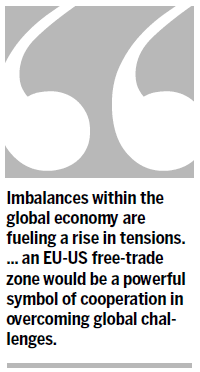The confirmation of Michael Froman as the US Trade Representative is a fitting moment to highlight the many opportunities that a free-trade agreement between the European Union and the United States would offer Europe, America and the world.
Today's three-tier global economy - 6 percent growth in emerging markets, 2 percent growth in the US and no growth in Europe - shows ominous signs of paralysis and nationalistic unilateralism. Many see currency wars looming.

In such an economically insecure global environment, riddled with protectionist booby traps, a free-trade pact between two of the world's largest trading blocs, accounting for roughly 40 percent of global GDP, has never been more important. Historically, free trade and economic growth have gone together, as have protectionism and stagnation, and deeper trade integration of the US and the EU economies would strengthen growth on both sides of the Atlantic.
The US economy's projected 2 percent growth this year, despite a 1.8 percent-of-GDP cut in government spending, implies real private-sector growth of 3.8 percent. Although the US Federal Reserve and the European Central Bank both have actively intervened to boost economic recovery, the results could not be more different.
In the US, the banking crisis was tackled rapidly and in a sustainable manner, while Europe is still going from one bailout to the next. Moreover, the US' stimulus program did work, notwithstanding criticism from the left for being too small and attacks from the right for being too large. Another contributing factor may be a basic difference in mentality: many Europeans tend to over-emphasize risk when assessing opportunities.
In any case, the US is the first country in the recession-stricken part of the global economy where public stimulus has led to enough private investment and growth to make fiscal consolidation possible. The more the US and the EU grow together, the more the EU will benefit from the US recovery.
Demand for European goods will increase, and the EU member states can - and should - align their economies with US growth. History suggests that the hope for a self-sustained recovery in Europe might well prove deceptive; almost always, the European economic cycle has followed and reinforced that of the US. Today, for example, a prolonged recession in Europe is, alongside budget cuts, generally seen as posing the greatest risk to a sustained US recovery.